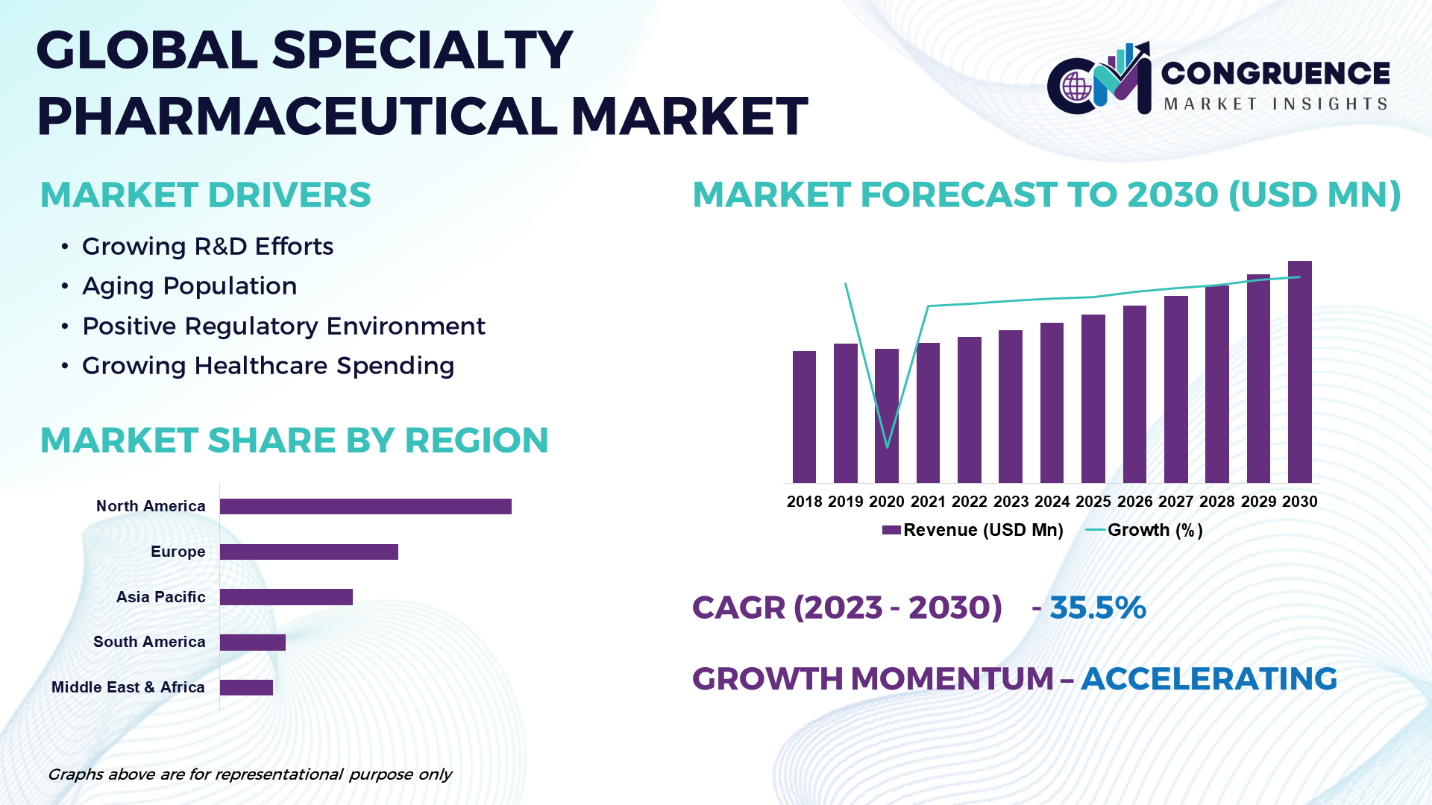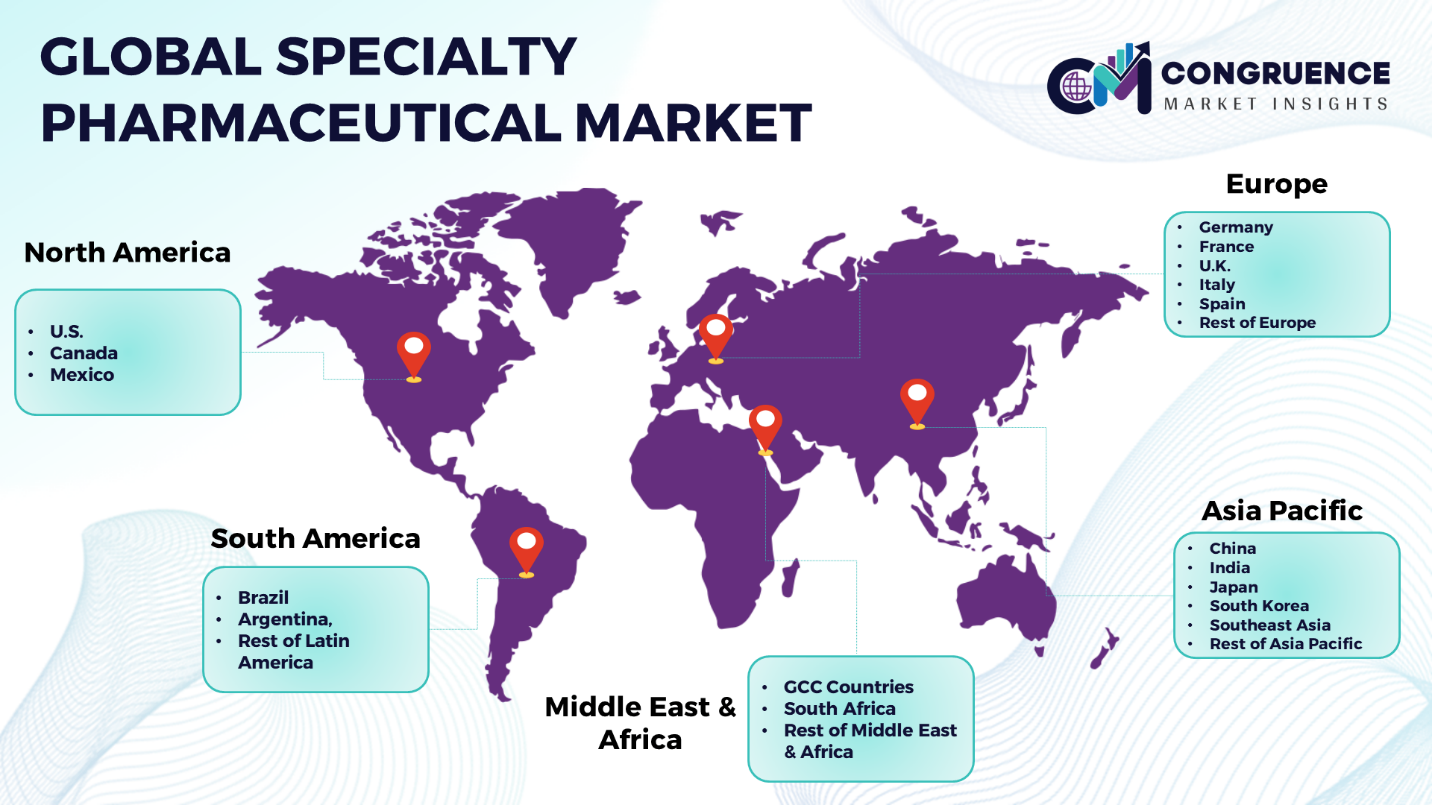Reports
The Global Specialty Pharmaceutical Market is expected
to expand at a CAGR of 35.5% between 2023 and 2030. Specialty
medications that fall within the categories of high expense, high complexity,
and high touch are also known as specialty pharmaceuticals. These treatments,
which can be injected or administered orally, parenterally, or transdermal, are
made from live cells. Specialty medications really account for a fast
increasing portion of all prescription expenditures made by both public and
private health programs. These medications are mostly used to treat severe,
protracted, or potentially fatal illnesses such multiple sclerosis, rheumatoid
arthritis, cancer, and growth hormone insufficiency. Traditional medications
are less costly than specialty drugs. Many of the most cutting-edge therapies
for a variety of grave illnesses, including cancer, HIV, and rheumatoid
arthritis, are included among these medications. Patients' life expectancy and
quality of life may be enhanced by a variety of specialist medications. The growing incidence of uncommon and
chronic illnesses throughout the globe is one of the main factors propelling
the specialty pharmaceutical market, as it raises demand for the tailored
treatments that specialty pharmaceuticals provide. Recent developments in
customized medicine and biotechnology also support market growth by providing
more efficient, patient-specific therapies.

Specialty Pharmaceutical Market Major Driving Forces
Growing R&D Efforts: To find innovative treatments for uncommon illnesses and unfulfilled medical requirements, pharmaceutical firms are making significant investments in R&D. This emphasis on innovation is what's fueling the market expansion for specialized medications.
Aging Population: As the world's population ages, chronic illnesses are more common and specialist drugs are in increased demand. Specialty pharmaceutical businesses have chances since older persons are more probable to need long-term drug treatment.
Positive Regulatory Environment: Since specialty medicines play a vital role in meeting unmet medical requirements, regulatory bodies are taking steps to speed up the approval process for them. The regulatory landscape is favorable, which is promoting market expansion.
Growing Healthcare Spending: Both public and private sectors are devoting large sums of money to healthcare, which is improving access to specialized medications. Increased investment in healthcare enables the uptake of cutting-edge therapies and propels industry expansion.
Specialty Pharmaceutical Market Key Opportunities
Emerging Markets: There are a lot of prospects for market development in these quickly expanding countries, especially in Asia-Pacific and Latin America. In these areas, the market is growing due to factors including expanding awareness of innovative therapies, better healthcare infrastructure, and rising disposable income.
Partnerships and Cooperation: Research institutes, healthcare organizations, and pharmaceutical corporations working together can improve the creation and marketing of specialized drugs. Better market access results from the pooling of resources, knowledge, and risk made possible by strategic alliances.
Technological Developments: Novel specialized medications can be developed as a result of ongoing developments in biotechnology, nanotechnology, and gene therapy. The overall results of treatment, patient compliance, and medication efficacy can all be enhanced by these developments.
Specialty Pharmaceutical Market Key Trends
· Precision medicine and customized treatments are becoming more and more popular.
· Encouraged by regulatory rules, pharmaceutical companies are investing more and more in the discovery of treatments for uncommon illnesses.
· These services, which help patients and healthcare professionals in areas including adherence monitoring, side-effect management, and reimbursement assistance, are essential to the distribution and administration of specialty medications.
· The specialized pharmaceutical industry is being impacted by the advent and development of biosimilars, which are very similar copies of biologics that are authorized.
· Technological developments, such as telemedicine and digital health solutions, are changing the way specialized medications are prescribed, dispensed with, and tracked.
· The regulatory landscape is changing to take specialization medicines' distinctive qualities into account.

Market Competition Landscape
The specialized pharmaceutical industry is characterized by a dynamic and constantly evolving competitive environment. Many organizations, from well-known industrial giants to creative startups, compete for leadership and a bigger share of the market. Strong competition inspires creativity and exceptional performance as companies strive to differentiate themselves via better product quality, pricing policies, and customer service. Market dynamics are influenced by a wide range of events, such as new technological advancements, changes to legislation, and adjustments in consumer preferences. This dynamic rivalry promotes market expansion, mergers and acquisitions, and strategic alliances as corporations strive to remain ahead of the curve in a constantly changing market. Participants also face challenges and possibilities as a result of it. Prominent players in the market include:
· Teva Pharmaceutical Industries Ltd.
· Pfizer Inc.
· AbbVie, Inc.
· Amgen Inc.
· Johnson and Johnson
· Bristol-Myers Squibb Company
· Novo Nordisk
· Novartis AG
· Gilead Sciences, Inc.
· Sanofi S.A.
|
Report Attribute/Metric |
Details |
|
Base Year |
2022 |
|
Forecast Period |
2023 – 2030 |
|
Historical Data |
2018 to 2022 |
|
Forecast Unit |
Value (US$ Mn) |
|
Key Report Deliverable |
Revenue Forecast, Growth Trends, Market Dynamics, Segmental Overview, Regional and Country-wise Analysis, Competition Landscape |
|
Segments Covered |
· By Route of Administration (Oral, Parenteral and Transdermal) · By Application (Oncology, Multiple sclerosis, Inflammatory conditions and Infectious diseases) · By Distribution Channel (Offline and Online) |
|
Geographies Covered |
North America: U.S., Canada and Mexico Europe: Germany, France, U.K., Italy, Spain, and Rest of Europe Asia Pacific: China, India, Japan, South Korea, Southeast Asia, and Rest of Asia Pacific South America: Brazil, Argentina, and Rest of Latin America Middle East & Africa: GCC Countries, South Africa, and Rest of Middle East & Africa |
|
Key Players Analyzed |
Teva Pharmaceutical Industries Ltd, Pfizer Inc, AbbVie, Inc, Amgen Inc, Johnson and Johnson, Bristol-Myers Squibb Company, Novo Nordisk, Novartis AG, Gilead Sciences, Inc, Sanofi S.A. and Other Key Players |
|
Customization & Pricing |
Available on Request (10% Customization is Free) |
